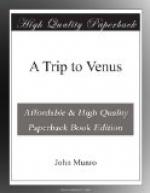Hence that opposition between science and poetry which Coleridge pointed out. The spirit of poetry is driven away by the spirit of science, just as Eros fled before the curiosity of Psyche.
How can I enjoy the perfume of a rose if I am thinking of its cellular tissue? I grow blind to the beauty of the Venus de Medicis when I measure its dimensions, or analyse its marble. What do I care for the drama if I am bent on going behind the scenes and examining the stage machinery? The telescope has banished Phoebus and Diana from our literature, and the spectroscope has vulgarised the stars.
Will science make an end of poetry as Renan and many others have thought? Surely not? Poetry is quite as natural and as needful to mankind as science. All men are poetical, as they are scientific, more or less.
It might even be argued that poetry is for the general, for the man as a man; while science is for the particular, for the man as a specialist; and that poetry is a higher and more essential boon than science, because it speaks to the heart, not merely to the head, and keeps alive the celestial as well as the terrestrial portion of our nature.
Shall we prefer the cause to the effect, and the means to the end, or exalt the matter above the form, and the letter above the spirit? Does not the tissue exist for the sweetness of the rose, the marble for the beauty of the stature, and the mechanism for the illusion of the play? The “opposition” between science and poetry lies not in the object, but in our mode of regarding it. The scientific and the poetical spirit are complementary, as the inside to the outside of a garment, and if they seem to drive each other away it is because the mind cannot easily entertain and employ both together; but one is passive when the other is active.
Keats drank “confusion to Newton” for destroying the poetry of the rainbow by showing how the colours were elicited; but after all was Newton guilty? Why should a true knowledge of the cause destroy the poetry of an effect? Every effect must be produced somehow. The rainbow is not less beautiful in itself because I know that it is due to the refraction of light. The diamond loses none of its lustre although chemistry has proved it to be carbon; the heavens are still glorious even if the stars are red-hot balls.
But stones, carbon, and light are familiar commonplace things, and fraught with prosaic associations.
True, and yet natural things are noble in themselves, and only vulgar in our usage. It is for us to purify and raise our thoughts. Instead of losing our interest in the universe because it is all of the same stuff, we should rather wonder at the miracle which has formed so rich a variety out of a common element.
But the mystery is gone, and the feelings and fancies which arose from it.




